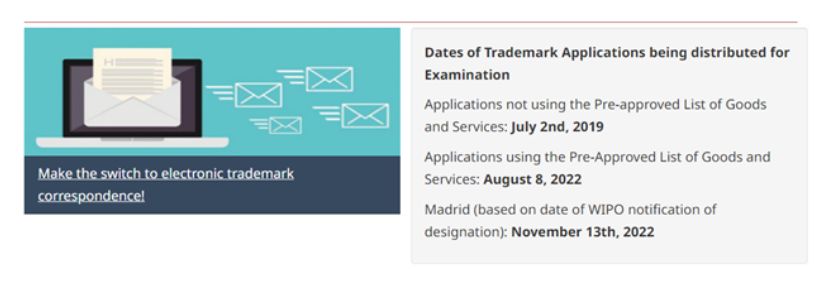Strike up the band—nearly five years after the coming into force (CIF) of major amendments to the Canadian Trademarks Act, the Canadian Intellectual Property Office (CIPO) has announced it has distributed all trademark applications filed prior to CIF (June 17, 2019) to examiners for first examination. As of February 28, 2024, CIPO's website was updated to show it has distributed for examination all trademark applications filed up until July 2, 2019 (previously, the date was "June 12, 2019").

Image taken from: https://ised-isde.canada.ca/site/canadian-intellectual-property-office/en/trademarks
In January 2020, about 6 months after CIF, the average time from application to first examination for most applications was about 16 months, and the delays were expected to last through 2020. In the intervening years, the backlog has grown. According to the World Intellectual Property Organization (WIPO), as of 2022, Canada had the longest delay between trademark filing and first examination in the world—860 days—and the second longest delay between trademark filing and final office action—990 days—second only to Cuba, at 1095.5 days. As of February 28, 2024, the time between filing and distribution for first examination in Canada was over 1,700 days.
The number of trademark applications filed has also steadily grown each year since 2012 when the figure sat under 50,000. According to CIPO's data, in 2018-2019 (the year before CIF), over 63,000 new applications were filed. The following year, 68,000 were filed. In the 12 months before March 2022 (the most recent figures available), that number was nearly 80,000. More than two-thirds (50,000) were domestic applications.
Faced with these statistics, CIPO has implemented a number of strategies and initiatives to address the backlog and attempt to provide faster examination, which are discussed below. Whether they will dislodge the jam and result in faster examination and registration remains to be seen.
1) Not all applications are created equal—swimming in the faster stream. In part to ensure CIPO complies with its obligations under the Madrid Protocol to provide first examination within 18 months of filing, CIPO began dividing examination into two streams after CIF—applications filed domestically, and those filed by designating Canada through the Madrid system. Later, CIPO further divided domestic applications into two categories—those filed using "pre-approved" goods and services from CIPO's "pick list" (terms specifically listed in CIPO's Goods and Services Manual) and those that are not—as a way to provide faster examination to a subset of those filings. As of February 28, 2024, the average time from filing to first examination for Madrid applications is around 16 months; for domestic applications using "pre-approved" terms, around 19 months; and for domestic applications using non-"pre-approved" terms, around 56 months.
2) Expedited examination in some cases—turbo-boosted examination. In May 2021, CIPO published a practice notice enumerating four circumstances where applicants could request expedited examination and "jump the queue": (1) a court action is expected or underway in Canada with respect to the applicant's trademark in association with the goods or services listed in the application; (2) the applicant is in the process of combatting counterfeit products at the Canadian border with respect to the applicant's trademark in association with the goods or services listed in the application; (3) the applicant requires registration of its trademark in order to protect its intellectual property rights from being severely disadvantaged on online marketplaces; and (4) the applicant requires registration of its trademark to preserve its claim to priority within a defined deadline and following a request by a foreign intellectual property office. Requests must be in the form of an affidavit or statutory declaration. There is no government fee associated with the request. Importantly, a successful request for expedited examination does not guarantee earlier registration —examiners remain entitled to raise objections to expedited applications, and applicants must still overcome any such objections before the application can proceed further. The time between filing the request for expedited examination and the issuance of an examiner's report is typically a few weeks.
3) Hiring more examiners and improving service standards—more boots on the ground. In 2022 and 2023, the Trademarks Office hired a large number of trademark examiners. On January 1, 2024, the Office implemented new trademark service standards that, for the first time, committed to provide first examination on domestic filed applications within a set amount of time—18 months from filing for applications in the "pre-approved" terms stream, and 28 months for those in the non-"pre-approved" terms stream. The new service standards do not speak to timelines for second and third Office actions. Over the last two years, the time for examiners to review Office action responses has moved from around 6 months to over a year.
4) Compressed timelines to respond during examination—applicants now face a "pitch clock". In January 2020, the Trademarks Office changed its practice with respect to extensions of time to respond to an examiner's report during examination. Previously, applicants were routinely granted one 6-month extension of time to respond to any office actions. Effective on publication of the practice notice, the Office dispensed with the "guaranteed" extension, and limited extensions of time to only "exceptional circumstances" justifying the extension. Where substantive objections are raised, applicants are limited to obtaining only one six-month extension over the course of examination. If an extension request is refused, the application will be considered in default, and the applicant given two months to rectify the default by filing a response to the examiner's report.
Relatedly, the Office has moved to compress timelines in opposition and non-use cancellation proceedings. Under a practice notice that came into force on December 1, 2023, benchmark extensions have generally been halved, and "cooling-off" periods to pursue settlement reduced to 7 months (down from 9 months).
Taking action
Prospective applicants and those already in the queue may wish to review their applications, and consider how to best take advantage of some of the accelerated timelines offered by CIPO.
The content of this article is intended to provide a general guide to the subject matter. Specialist advice should be sought about your specific circumstances.
